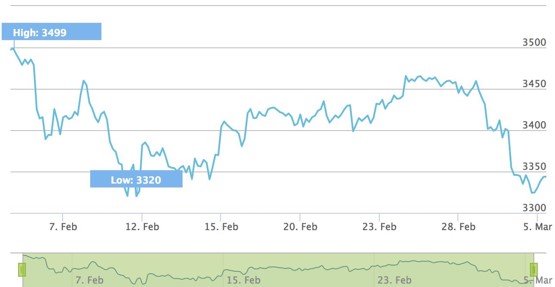Investment Strategies
Wealth Managers Relieved By German Political Progress After Italian Drama

Wealth managers try to make sense of the political situation in two major eurozone member states, while they also fret about the rising protectionist noise in Washington DC and Europe.
The outcome of national elections in Italy at the weekend –
producing a hung parliament – weighed on investors’ minds at a
time when transatlantic protectionism has also reared its head.
On the upside, moves to resolve political gridlock in Berlin was
seen as a positive move for markets.
On Sunday, Italian voters produced a result where none of the
three main factions in Italy would be able to govern alone, with
little chance of a return to a mainstream form of government. The
outcome again raises questions on whether Italy’s economy can be
reformed and withstand the disciplines of the European single
currency.
A rightist alliance including former prime minister Silvio
Berlusconi’s Forza Italia (Go Italy!) held the biggest bloc of
votes. The anti-establishment 5-Star Movement became Italy’s
largest single party. As at the time of writing, media reports
(Reuters, other) said the centre-right coalition was on
course for 37 per cent of the vote and 5-Star for 31 per cent.
The ruling centre-left coalition came in third at 22 per
cent.
At the same time, the long-running negotiations to form a grand
coalition government in Germany, following indecisive election
results last September, appeared to be bearing fruit, reports
said.
Recent days have seen worries rise about protectionism, with US
President Donald Trump saying he will slap tariffs on steel and
aluminium imports, a move criticised by foreign governments and
potentially raising risks of a trade fight. (The move has also
been criticised in the US, with commentators saying that higher
prices for steel and aluminium will hurt sectors such as
breweries and autos.) Fears about global trade added to a sense
that the decade-long bull market in equities faces increasing
headwinds.
In early trade today, there was some selling of the euro against
the dollar, before the rate recovered somewhat, commentators
said. At around 10:30 GMT in London the euro/dollar rate was
around 1.2330 (source: Bloomberg).
The Euro Stoxx 50 Index of blue-chip European equities sell in very early European dealing time before recovering. (See chart from www.stoxx.com below):

The Italian Job
“The election result is very important for international
investors, especially given the size of the Italian economy.
While Eurosceptic parties have done well, exit from the euro and
EU are low risk. This is because Italy's constitution does not
allow for such a vote, and a change in the constitution would
require a two-thirds majority, which left and right wing
Eurosceptic parties do not command,” Azad Zangana, senior
European economist, Schroders, said.
“The bigger risk is fiscal slippage, and possibly the rolling
back of important reforms from recent years. This would put Italy
on a collision course with the European Commission, and may even
awaken the dormant bond vigilantes,” Zangana continued.
“A government led by extremist parties could prompt international
investors to dump Italian government bonds, causing yields to
rise sharply on its huge mountain of government debt worth around
as €2.2 trillion or 133 per cent of GDP at the end of 2017. For
now, bond buying by the European Central Bank is likely to keep
markets calm. However, we do expect quantitative easing to end
later this year, making Italy more vulnerable,” Zangana
added.
Nikki Howes, investment analyst at UK wealth management firm
Heartwood, said Italian politics looks set to be stuck in a
stalemate. “A hung parliament probably maintains the status quo.
Note this will be Italy’s 65th government since World War II. A
coalition led by a centre-right bloc of parties (with a
sprinkling of populist forces) appears to be the most likely
outcome. Otherwise, President Mattarella may reappoint the
current Prime Minister Gentiloni to lead a new technocrat
government until fresh elections are called. None of these
outcomes necessarily heralds greater stability, but a worst case
scenario of a minority populist government has at least been
averted, thanks to electoral law changes last October.”
“Financial markets remain relatively calm and resilient compared
with previous sovereign events in Europe over recent years. Much
of this sanguinity is down to the economic improvements Italy has
seen since the second half of 2017, helped by the recovery in
manufacturing, improving consumer confidence levels, and receding
deflation risks. A more supportive economic environment has also
helped to neutralise some of the more extreme policies of the
anti-establishment parties. However, finding consensus to address
Italy’s large structural economic problems will prove
challenging, given the diverse range of views among the political
parties. Italian politics is likely to be locked in a state of
paralysis in the near term,” Howes said.
Grand coalition
While most stock markets appeared little changed overall, perhaps
reassured by signs of political progress in Berlin.
Angela Merkel at the weekend secured a fourth term as Chancellor
after the centre-left SPD supported a grand coalition with the
Christian Democrats and Christian Social Union parties. German
politics has been in limbo since the September national polls
last year, which failed to deliver a decisive result.
“While Germany is getting its political house in order, with the
Social Democratic Party having accepted to form a grand coalition
with Chancellor Merkel’s Christian Democratic Union Party,
Italians are waking up to a possible new world order,” Serge
Pépin, director, global equities at BMO Global Asset Management,
said.
“Given the uncertainty and the possibility of a hung parliament,
the domestic Italian stock market will likely spend the session
today marred in red ink, whilst the general European equity
market, currently in negative territory, may find solace
following news of Germany’s Grand Coalition. Investors will also
likely be concerning themselves with the anti-trade rhetoric of
the US President [Trump] and the impact on the continent’s
exporters and industries,” Pépin said.